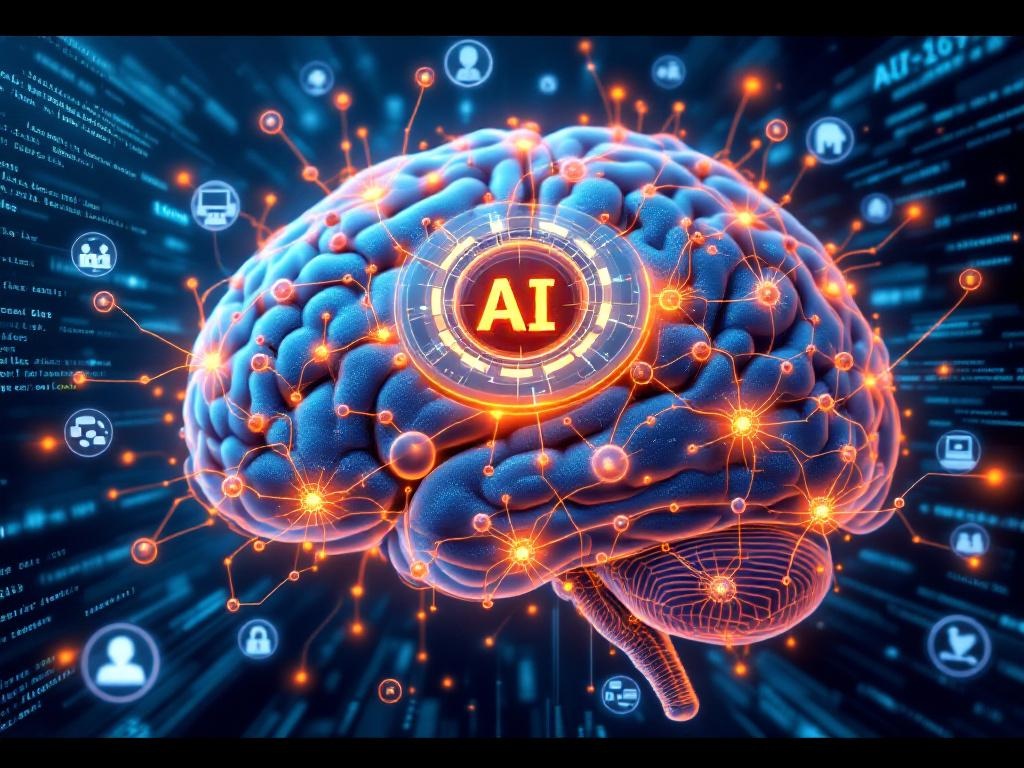In the wake of AI-powered deception in the hiring process, top tech companies are reviving the art of the in-person interview. This tactical shift aims to mitigate the risk posed by candidates using AI to manipulate remote interviews, ensuring a more authentic assessment of their abilities.
The Surge of AI-Assisted Cheating in Virtual Interviews
In the era of rapid technological advancement, the recruitment landscape within the tech industry is undergoing a significant transformation. The surge of AI-assisted cheating in virtual interviews has emerged as a critical challenge, undermining the integrity of the hiring process. Reports suggest that over half of the candidates in virtual interviews are now leveraging AI tools to assist with coding tests. This widespread use of artificial intelligence significantly complicates genuine skill assessment, leading to major concerns about maintaining a fair and just evaluation process during recruitment.
Major tech companies, acutely aware of these challenges, are adjusting their hiring practices to combat AI-enabled fraud. Leaders in the industry, such as Sundar Pichai, CEO of Google, have endorsed hybrid hiring models to navigate this new terrain. Specifically, Google has introduced a requirement for at least one in-person interview round. This shift aims to verify the fundamental skills of candidates, ensuring that their capabilities are genuinely as represented. Such policies, prohibiting AI assistance during interviews, are implemented across the board to deter misuse and reinforce the importance of authenticity in the hiring process.
The reliance on virtual hiring processes was massively accelerated by the pandemic, necessitating a swift adaptation to online platforms for interviews and assessments. However, the unintended consequence of this transition has been the erosion of certain aspects of recruitment integrity, notably the ability to assess candidate skills and characteristics accurately and fairly. Consequently, there has been a marked shift back to in-person interviews among major tech firms, including Cisco, McKinsey, Amazon, and Deloitte, signaling a significant change in approach designed to preserve the authenticity of the recruitment process.
While AI continues to play a role in the initial stages of hiring, such as screening applications and initial assessments, concerns around bias and the need for human oversight remain paramount. The integration of AI in the hiring process necessitates a balanced approach, where technology enhances rather than undermines the integrity of recruitment. In this context, in-person interviews serve as a crucial mechanism for ensuring a fair assessment of candidates, providing a space for interaction that technology cannot fully replicate.
The rising demand for in-person interviews is evidenced by some recruiters reporting a substantial increase in client requests for face-to-face meetings. This trend indicates a growing recognition of the value of personal interaction in evaluating a candidate’s true potential and skills. In-person interviews offer an opportunity to gauge not only technical abilities but also soft skills and cultural fit, dimensions of candidate assessment that are challenging to evaluate through virtual means alone.
This shift towards reintegrating in-person interviews into the recruitment process represents a broader industry effort to navigate the challenges posed by AI-enabled fraud. By combining technology with traditional evaluation methods, tech companies are striving to establish fairer hiring practices. This approach aims to ensure that the recruitment process remains a rigorous and authentic assessment of candidate capabilities, thereby preserving the integrity of the tech industry’s workforce. The move back to face-to-face hiring is not only a response to the challenges posed by artificial intelligence but also a reaffirmation of the value of human interaction in making critical decisions about talent acquisition.
Reestablishing the In-Person Interview
In the wake of the discovery that over half of the candidates in virtual interviews leverage AI tools to augment their performance, primarily in coding tests, major technology companies have been compelled to recalibrate their hiring strategies. Google, Amazon, Cisco, McKinsey, and Deloitte, among other industry heavyweights, are steering back towards in-person technical interviews as a cornerstone for recruitment. This shift underscores a growing recognition of the imperative to ensure candidate authenticity, assess their grasp of fundamentals firsthand, and safeguard the integrity of the recruitment process.
Companies are increasingly acknowledging that virtual interviews, although convenient and broadening the scope for international talent acquisition, have inadvertently lowered the barriers for AI-assisted cheating. This realization catalyzed a significant shift towards re-establishing in-person interviews. Notably, Sundar Pichai of Google has been vocal about adopting hybrid hiring models, illustrating a balanced approach where virtual methods are complemented by compulsory in-person rounds to vet the fundamentals. This model reflects a pragmatic stance, aiming not only to curb the misuse of AI but also to retain the essence of human interaction that is pivotal in discerning the true capabilities and the fit of a candidate.
To deter the misuse of AI tools during interviews, these tech giants have implemented stringent policies that explicitly prohibit AI assistance. The reinforcement of such policies is not just a deterrent but a declarative step towards emphasizing the value of genuine skill and integrity in the hiring process. These measures mirror the industry’s collective stand against compromising the quality of hires for the sake of convenience.
The pivot back to in-person interactions marks a profound departure from the pandemic-induced reliance on virtual hiring practices. During the global crisis, virtual interviews became the norm, heralding an era where geographical boundaries seemed to blur in the corporate recruitment landscape. However, the resurgence of traditional, face-to-face interviews not only underscores the limitations of virtual assessments, particularly in technical domains but also revitalizes the essence of personal interaction in making holistic hiring decisions.
Moreover, while AI continues to play an increasingly pivotal role in streamlining hiring processes, from resume screening to initial candidate engagement, the concerns surrounding its potential to introduce bias and circumvent genuine evaluation cannot be overlooked. Consequently, human oversight remains an integral part of the equation, ensuring that the use of technology enhances rather than detracts from the recruitment process.
The demand for in-person interviews is on an upward trajectory, with recruiters witnessing a substantial uptick in client requests for face-to-face meetings. This burgeoning demand is not merely a knee-jerk reaction to the challenges posed by AI-assisted cheating; it reflects a deeper, industry-wide endeavor to realign recruitment practices with the core values of authenticity, integrity, and holistic assessment. By weaving technology with traditional evaluation methods, major tech companies are charting a course towards fairer, more reliable hiring practices.
In conclusion, the strategic shift towards in-person technical interviews among leading tech organizations is a testament to the industry’s resolve to combat AI-enabled fraud in recruitment. By reinstating face-to-face interactions as a standard practice, these companies are not only taking a stand against unethical practices but are also reaffirming their commitment to excellence, integrity, and the irreplaceable value of human judgment in the recruitment process.
AI’s Double-Edged Sword in Recruitment
In the realm of technology recruitment, Artificial Intelligence (AI) presents a double-edged sword, encapsulating the formidable challenge of advancing hiring processes while ensuring the maintenance of recruitment integrity. As major tech companies like Google, Cisco, McKinsey, Amazon, and Deloitte pivot back towards in-person technical interviews, they seek to preserve the sanctity of the assessment process. This shift is not only a testament to the traditional ethos of recruitment but also an acknowledgment of the sophisticated challenges posed by AI-assisted cheating in hiring.
The burgeoning reliance on AI for streamlining recruitment processes is transforming the landscape of talent acquisition. AI applications are utilized to sift through vast quantities of applications, identifying potential candidates with precision and speed unattainable by human recruiters. This leap in efficiency allows for a heightened focus on candidate experience, offering personalized feedback and timely communications, thereby enhancing the overall quality of the recruitment journey. However, the flip side reveals potential pitfalls; over half of candidates in virtual interviews reportedly utilize AI tools to aid in coding tests. This alarming statistic illuminates the intricate challenge of evaluating genuine skill in an increasingly digitalized hiring environment.
Leaders within the industry, such as Sundar Pichai of Google, suggest a pragmatic approach through hybrid hiring models. This method incorporates at least one in-person interview round to thoroughly verify a candidate’s fundamental knowledge and skills, thereby anchoring the recruitment process in authenticity. The implementation of policies strictly prohibiting AI assistance during interviews serves as a deterrent to misuse and upholds the principle of fair competition.
The extensive shift back to face-to-face interviews signifies a considerable departure from the purely virtual hiring processes that became ubiquitous during the pandemic, underscoring a collective industry effort to confront AI-enabled fraud. Despite the enhanced efficiencies facilitated by AI in screening and initial assessments, human interaction in the recruitment process remains irreplaceable for ensuring the integrity and transparency of hiring.
However, the integration of AI in recruitment is not devoid of its criticisms, particularly regarding potential biases and the need for oversight. The development and application of AI technologies in hiring necessitate robust mechanisms to mitigate implicit biases that could inadvertently be encoded into algorithms. The human element in recruitment, therefore, continues to play a critical role, not just in the final decision-making but also in overseeing AI functionalities to ensure they align with ethical hiring practices.
Simultaneously, the revival of in-person interviews reflects a rising demand among recruiters and clients alike for a more holistic evaluation of candidates. Reports suggest a substantial increase in requests for face-to-face meetings, indicating a market response to the challenges posed by remote recruitment practices. This trend towards in-person interactions underscores the industry’s endorsement of technology as a facilitator rather than a replacement for the human elements of recruitment.
In this complex landscape, the intersection of technology and traditional hiring practices fosters a dynamic environment for talent acquisition. AI’s role in recruitment, while fraught with challenges, also offers unprecedented opportunities for improving hiring processes and candidate experiences. As major tech companies navigate this new era, the marriage of AI with conventional evaluation methods aims to establish a fairer and more effective hiring practice. This dual approach, leveraging the best of technology and human insight, embodies the pragmatic and innovative spirit guiding the future of tech recruitment.
Hybrid Hiring: Google’s Response to AI Challenges
In the evolving landscape of tech recruitment, hybrid hiring models have emerged as a pivotal strategy for companies striving to maintain integrity in the hiring process while still harnessing the efficiency of technology. Google, a forefront runner in innovative hiring practices, has adeptly navigated these challenges by implementing a model that integrates both virtual and in-person interviews. This approach not only underscores the company’s commitment to authentic candidate evaluation but also serves as a benchmark for the industry, particularly in combating the rise of AI-assisted cheating in virtual technical interviews.
Google’s hybrid hiring model was designed in response to a significant challenge: the widespread use of AI tools by candidates during virtual interviews to assist with coding tests and other technical assessments. Reports suggest that over half of the candidates in virtual technical interviews may use some form of AI assistance, complicating the assessment of genuine skills and undermining the integrity of the hiring process. To address this, Google, alongside other tech giants like Cisco, McKinsey, Amazon, and Deloitte, has re-introduced in-person interviews into its recruitment funnel. By requiring at least one round of face-to-face interviews, Google ensures a crucial check on candidate’s fundamental skills and authenticity, unaided by AI solutions.
Moreover, the hybrid model reflects Google’s nuanced understanding of the potentials and pitfalls of technology in recruitment. By blending virtual and in-person interviews, Google not only leverages the efficiency and reach of digital platforms but also reinstates the human touch crucial for evaluating a candidate’s interpersonal skills, cultural fit, and professional demeanor—qualities that are often challenging to gauge through a screen. Despite the sophistication of AI in screening and evaluating candidates, Google’s approach acknowledges the indispensable value of human oversight in the final hiring decisions.
To further deter the misuse of AI during interviews, policies explicitly prohibiting AI assistance have been implemented, signaling a clear stance on maintaining hiring ethics. This policy shift represents a broader call for integrity in tech recruitment, acknowledging the complexity of ensuring fair play in an increasingly digital hiring landscape. As the industry grapples with the dual-use nature of AI in recruitment—wherein it can both streamline the hiring process and introduce new avenues for deception—Google’s strategy offers a balanced response that prioritizes authenticity.
The resurgence of in-person interviews as part of Google’s hybrid model marks a significant change from the pandemic-induced reliance on virtual hiring. It also reflects a broader industry trend towards reassessing the role of digital tools in recruitment. While the pandemic accelerated the adoption of virtual interviews, the experience has underlined the limitations of purely digital interactions in assessing candidates comprehensively. Consequently, there’s a rising demand among recruiters and clients alike for face-to-face meetings, demonstrating a collective effort to ensure a more holistic and genuine evaluation process.
Google’s hybrid hiring model, therefore, represents a strategic adaptation to the challenges posed by the integration of AI in recruitment. By maintaining a balance between the efficiency offered by virtual platforms and the authenticity facilitated by in-person interviews, Google sets a precedent in leveraging technology to enhance, rather than compromise, the integrity of recruitment processes. This approach not only addresses immediate concerns related to AI-assisted cheating but also charts a course for the future of tech hiring, where technology and tradition coalesce to achieve fairer and more authentic hiring practices.
The transition towards hybrid hiring also underscores a deeper consideration of quality over quantity in candidate selection. In prioritizing genuine skill assessment and high-integrity hiring, companies like Google signal a commitment to fostering a workforce built on true meritocracy, thereby strengthening their competitive advantage in the tech industry. This shift, echoing through the sector, prepares the ground for the next chapter in tech recruitment’s evolution: a growing preference for face-to-face interviews as a means to ensure hiring authenticity while offering richer insights into company culture and candidate compatibility.
The Growing Preference for Face-to-Face Interviews
In the rapidly evolving landscape of tech recruitment, the resurgence of in-person interviews constitutes a strategic pivot by major companies aiming to assure the integrity of their hiring processes. This shift, signifying a move away from the exclusively virtual recruitment methods necessitated by the pandemic, underscores a growing consensus: the indispensable value of human interaction in evaluating a candidate’s genuine capabilities and fit within a company culture. The growing preference for face-to-face interviews among giants like Google, Cisco, McKinsey, Amazon, and Deloitte evidences a broader industry trend, whereby the infusion of traditional evaluation methods with cutting-edge technology aims to forge a fairer and more authentic hiring practice.
The reliance on virtual interviews during the pandemic saw a sharp incline in candidates utilizing AI tools to assist with coding tests and other evaluative measures. Reports suggesting that over half of candidates in virtual settings may have employed such artificial assistance have cast a shadow over the authenticity of skills assessment, propelling companies to reevaluate their recruitment strategies. The candid acknowledgment from industry leaders, such as Sundar Pichai, regarding these challenges, has catalyzed a hybrid model of hiring. However, even within these models, the necessity for at least one in-person interview round to verify a candidate’s fundamental skills and personals integrity has become increasingly evident.
This return to face-to-face interaction not only addresses concerns around AI-assisted cheating but also allows companies to better gauge a candidate’s interpersonal skills, problem-solving abilities, and cultural fit. Through direct interaction, recruiters can observe nuances in communication, critical thinking, and collaborative potential that AI and virtual settings might not fully capture. Policies explicitly prohibiting AI assistance during interviews serve as both a deterrent against misuse and a statement of commitment to recruitment integrity, reflecting an industry-wide ethos of fairness and authenticity in talent acquisition.
Moreover, the shift back to in-person interviews is indicative of a larger reassessment of virtual hiring practices adopted during the pandemic. While the technological advancement allowed companies to continue recruiting despite global lockdowns, it also exposed vulnerabilities in purely digital recruitment processes—namely, the challenge of ensuring candidate authenticity and preventing AI-facilitated dishonesty. The reintegration of in-person interviews into hiring protocols marks a significant adaptation, balancing the efficiency of digital processes with the irreplaceable value of human interaction.
Despite the increasing employment of AI in initial hiring stages—ranging from resume screening to preliminary assessments—concerns around bias and the need for human oversight have remained at the forefront. As such, the preference for face-to-face interviews aligns with a broader industry movement towards more transparent, equitable, and human-centric recruitment practices. Furthermore, recruiters have observed a substantial uptick in requests from clients for in-person meetings, suggesting that the demand for direct interaction extends beyond the confines of tech companies, touching on a universal desire for authentic connections in the professional sphere.
The growing inclination towards face-to-face interviews not only reflects a pragmatic response to the challenges posed by AI-assisted cheating but also signals a deeper, more fundamental shift in tech recruitment strategies. By melding the best of both worlds—leveraging technology for efficiency while upholding traditional methods for integrity—companies are navigating the new era of recruitment with a renewed emphasis on authenticity, fairness, and human interaction. This chapter, following the discussion on Google’s hybrid hiring model, underscores the industry’s commitment to refining the balance between technological innovation and the timeless value of personal engagement in cultivating a workforce that is both skilled and genuinely aligned with company values and culture.
Conclusions
As the tech industry grapples with the challenges of AI-assisted cheating, there’s a clear pivot back to in-person interviews. This strategic shift not only ensures the fidelity of the hiring process but also reaffirms the need for human connection and authenticity in talent acquisition.



